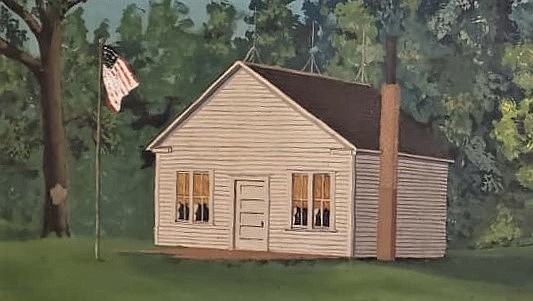Decades ago, long before consolidation of school districts heralded their extinction, small schoolhouses were scattered across the local landscape, representing the primary means of education for students of many ages in rural communities.
One of these small utilitarian buildings was known as the Van Pool School, quietly tucked within a forested area a short distance northwest of Russellville.
Located along Van Pool Road in Moniteau County, both the road and nearby schoolhouse were named for the Van Pool family, who were among some of the earliest settlers to arrive in the Russellville area in the mid-1830s.
Established in the mid-1890s, the "Moniteau County, Missouri Family History Book" published in 1980 by the county's historical society notes "(t)he first building was a log school up on a hill from the last school house in the valley or flat as most people call it."
The second school house, a small white structure, was like many rural schools of the period, hosting a handful of students from the local area and generally included academic instruction through the eighth-grade level. This education was generally provided by a single teacher, referred to as a professor, who oftentimes pursued his or her own college education while also teaching.
According to an article appearing in the Russellville Rustler (newspaper) on July 6, 1897, the composite of student body provided the fodder for an interesting editorial containing bold predictions for the future with regard to gender equality.
"The annual report of commencement proceedings again reveals the fact that girl graduates outnumber their boy associates about four to one, and it is the exception when the honors of the class are not borne by the fairer and the frailer sex. Who can say what effect this will be upon the coming generation if this startling disproportion continues?" the article said.
"If the world is to be governed by mind instead of muscle, and we do not doubt it, can anything withstand the sure prophecy of present events, which clearly reveals that woman will be, at least, man's equal in home, in church, and in government," the newspaper added.
The student population may have wavered throughout the years, but in the fall of 1931, during the early stages of the Great Depression, the school system was thriving with a reported enrollment of 30 students. Oddly enough, a few months earlier, the school reported a single graduate. At the time, McGirk native Archie Reichel was serving as the school's professor.
The Daily Capital News described Reichel as "one of Moniteau County's most popular teachers." However, despite a booming enrollment at such a small school while the nation was entering the Great Depression, the year 1931 may have been one of the most memorable for young Reichel since, in late October, he married the former Gladys Irwin, of Kansas City.
Donn Schmoeger, who owns the property on which the former schoolhouse once stood, said, "Both my mother and father attended the small school. I can recall my father telling me that sometime between World War I and World War II, the teacher told all the students to bring their parents to school the next day."
Grinning, he added, "Apparently, he wanted to discuss having the students speak in English rather than the German they had been using."
His father, Wilbert Schmoeger, a 1936 graduate of Van Pool School, would not only spend his lifetime farming in the same area where he attended classes, but later volunteered to serve as one of the school's directors alongside other past graduates, such as Herbert Wyss.
Archie Reichel, whether recognizing the upcoming consolidation of rural school districts or seeking a more robust salary than the $100 a month paid to his replacement at Van Pool School in 1944-45 school year, made the decision to accept a position teaching English courses at Kemper Military School in Boonville. He would go on to retire from Kemper after teaching from 1945-73.
The popular former teacher of Van Pool School and his wife lived their remaining days as residents of Boonville, where they raised their three children. In addition to his career in teaching, Reichel served as president of the Missouri State Baptist Brotherhood.
Van Pool School closed in 1947 after it was consolidated into the school district in nearby Russellville. When Donn Schmoeger's family acquired the property on which the school set in the early 1960s, the school building was still standing. Yet, as has been the fate of many a rural schoolhouse, it was torn down in the late 1960s since it had fallen into a state of disrepair.
These days, all that remains of this once bustling schoolhouse are a handful of memories and a flat, wooded patch where the building stood. Nearby, there is also a thick slab covering an old cistern and a concrete pit on top of which sat one of the outhouses.
In later years, a painting was made of Van Pool School, which was acquired by Donn Schmoeger's father. This painting, Schmoeger said, is a treasured possession and serves as a connection to his late father. Furthermore, it has become one of the only surviving links to the near-forgotten past of a small schoolhouse in the woods and an extinct component of the rural education system.
Jeremy P. Amick is writing a series of articles highlighting the history of the Russellville area in honor of Missouri's bicentennnial.

